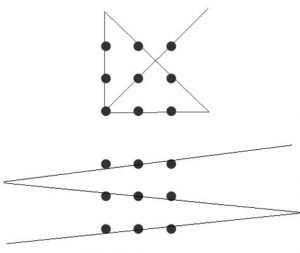You clump all of the wood material and stack it on top of each other. And start the fire. But, the fire doesn’t catch on. All the wood is right there. Something is not working. What is it? An experienced camper taps you on the shoulder and you step aside. She rearranges the wood in some pattern that you can’t make sense of. And lo and behold, a brilliant blaze starts leaping up towards the sky! What did the camper do? She created space, oxygenating space, as Juliet Funt calls it. Fire needs air to move through the wooden pile and supply oxygen. In the previous arrangement, there was no space and no air movement. When the space is there, you have a fire!

Courtesy – Pixabay
Where is the oxygenating space for us in our lives? To power us towards achievement. Funt calls it white space, in reference to the white that signifies free time on our scheduling calendar. Coloured is time blocked. White is time without anything scheduled. This time – creating it, safeguarding it, and expanding it – holds the key to wresting back a sense of composure, control and agency in our life.
What do we do with this white space, this time?
Just be. We can use it to stare out of the window, doodle, do anything that comes spontaneously. Without trying. This is like reboot time. Or recovery. Research shows that when a person is still or minimally active, the brain areas related to creativity, insight, and innovation are activated. This is happening when you are sitting at your desk and doing absolutely nothing.
With such huge benefits, why don’t people create this white space, this free time on their calendar?
Primarily because most achievers and leaders equate being busy with being purposeful and productive. If you are not active, you are not being productive, so goes the guiding thought.
86% of leaders complain that they are too busy to do things that make a real difference. They know it! However, they respond by maxing out on being efficient; by doing more. If a top leader scans the calendars of his capable subordinates and sees only colour and no white, that is something to probe. In this white space, leaders can reclaim what has always been the key to their success and now even more so as they are reaching the top – Thinking time. Time to just think, that’s it. Outstanding achievers in any field will vouch for it – the value of thinking time. Bill Gates used to take 2 weeks off even in his heyday – to read books and think. He called them ‘think weeks’. He was a nerd and a workaholic, but he knew the value of creating time to think.
Do you have white space in your schedule? Time where you purposefully don’t do anything. You can start small. Schedule a 5 minute break between two back to back minutes. And do nothing in those 5 minutes. To create white space requires planning. But, no planning on what to do during the white space. Then, it ceases to be white space, it becomes deliberate, the brain is in cognitive mode. Watching a relaxing video or listening to music is not white space. Neither is a personal call to catch up with a dear friend or family member. White space is being open to what emerges when you do nothing.
Why do we end up becoming so busy that we don’t have any white space in our lives?
To be fair to us, we don’t start off wanting to be buried in our routines. We focus on four things that are key to achievement and success.
– Drive
– Excellence
– Information
– Activity
Ironically, when we excel in these four things too much, they degenerate into disorders that prevent us from achieving effectiveness and greatness.
Drive turns into Overdrive.
Our cup is full to the brim with 5 assignments. A 6th one that will cause things to spill over is offered. And we take it. A whispering voice that has fuelled your drive becomes louder in that moment. And you say yes.
Excellence turns into Perfectionism.
Attention to detail becomes an all consuming affair. The spacing alignment of excel entries becomes as important as the accuracy of the data.
Information turns into Information overload.
You want to be on top of every update in your key result areas. You ask for daily updates when definitive progress happens across a fortnight.
Activity turns into Frenzy.
You cannot afford to take a day off even when you or your family member are ill. When you find a free time-block, you become certain that there is a meeting, someone has forgotten to block your time.
How can we tackle these thieves of time – overdrive, Perfectionism, Information overload, Frenzy?
To overcome perfectionism, you can ask – Where is ‘good enough’, ‘good enough’? Step back and check whether this is improving business results or making your life better. If it is, it is excellence.
To combat information overload, you can ask – What do I truly need to know? Additionally, you can do some good within your team. Before marking a CC, think WAIT – Whose Action is This. Think again about whether the rest actually need to invest their time in even knowing about the matter. Another great tip is to walk to your subordinate and say – “You can switch off your notifications when it comes to mails and messages from me. I don’t expect you to respond immediately, unless I specify it for a time-sensitive matter”
To liberate yourself from Frenzy, you can ask – What deserves my attention?
Since Funt didn’t speak about Overdrive and I haven’t experienced it yet, I desist from going on an overdrive in finding a solution to that ![]()

Courtesy – Neatorama
The famous nine dot puzzle gets solved because the white space comes into play. The nine dots lock us into the box. The white space is the solution. If only we could see it that way!
White Space can be for just one minute. That is the name of Funt’s new book – Just a minute!